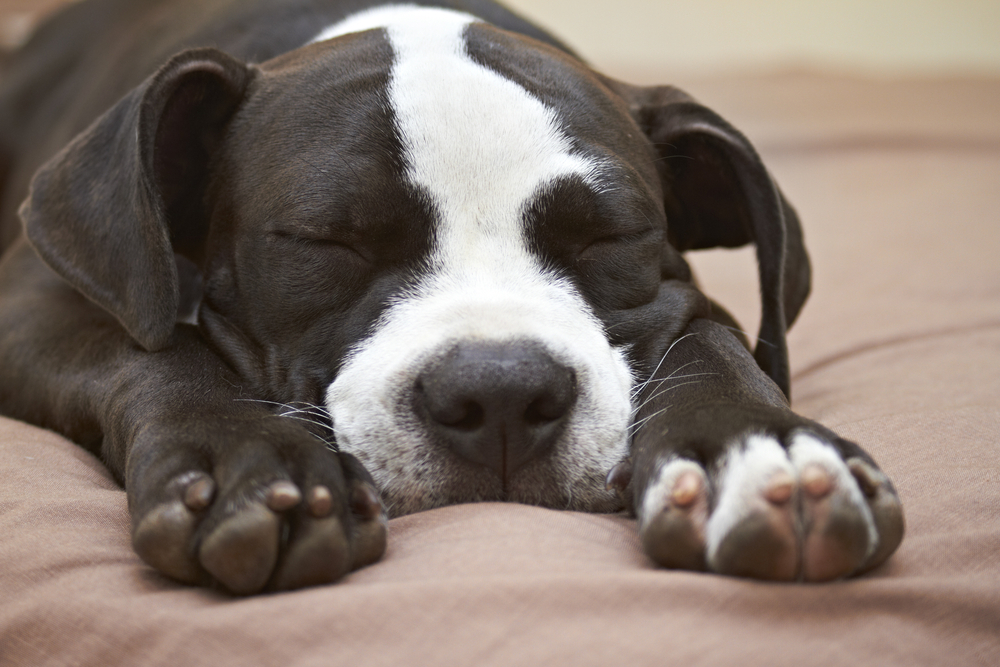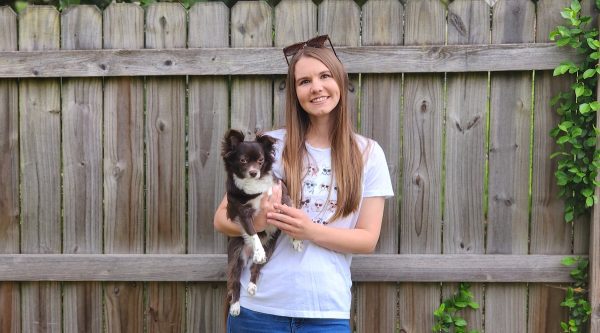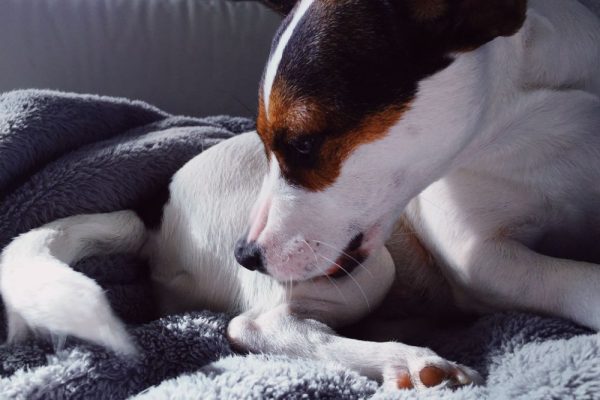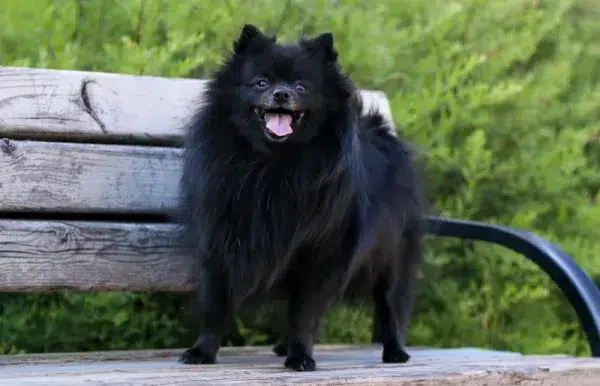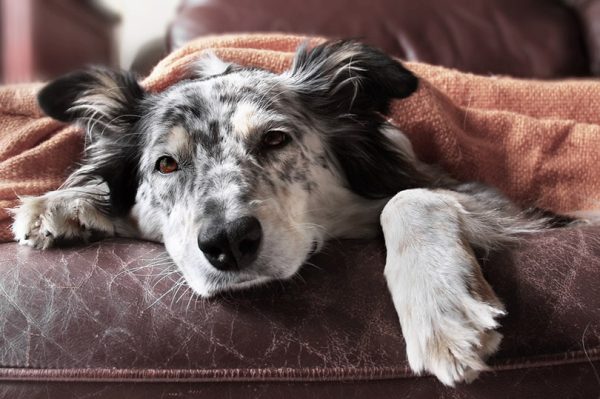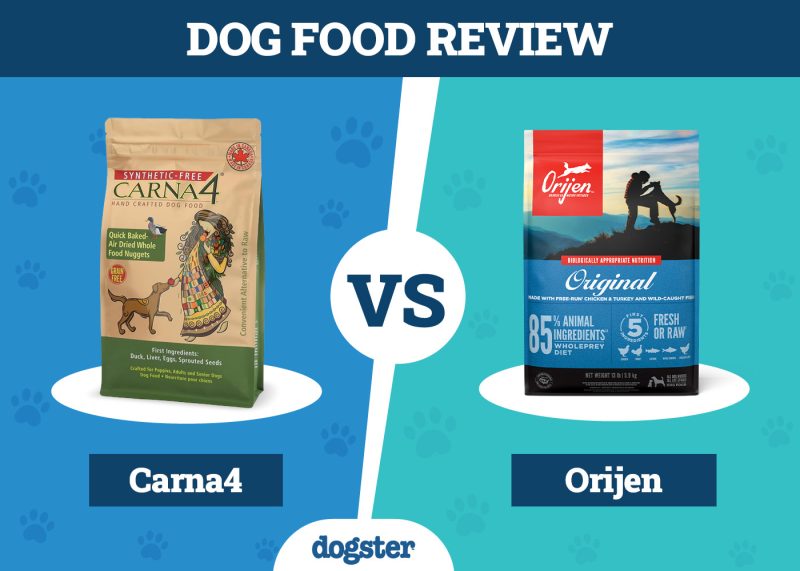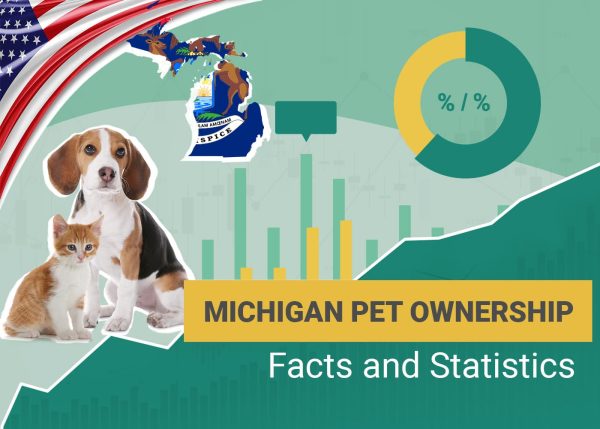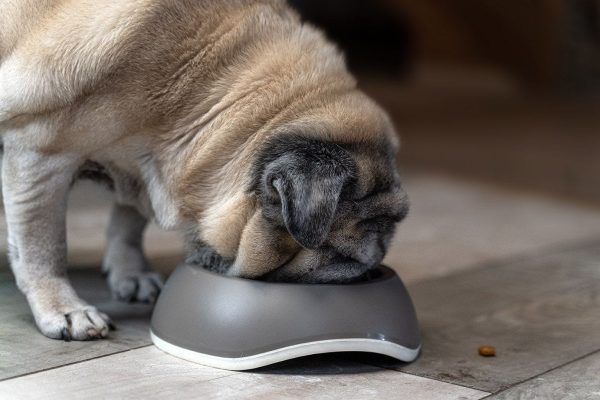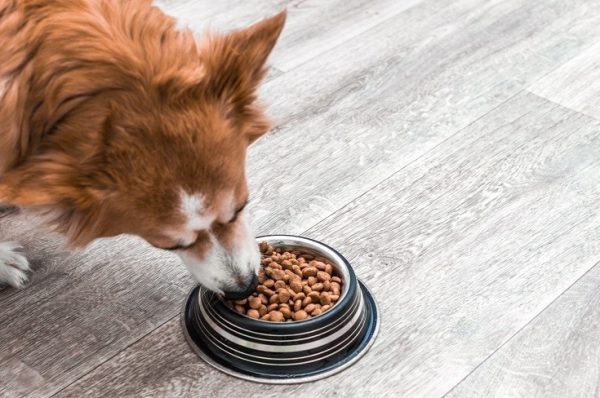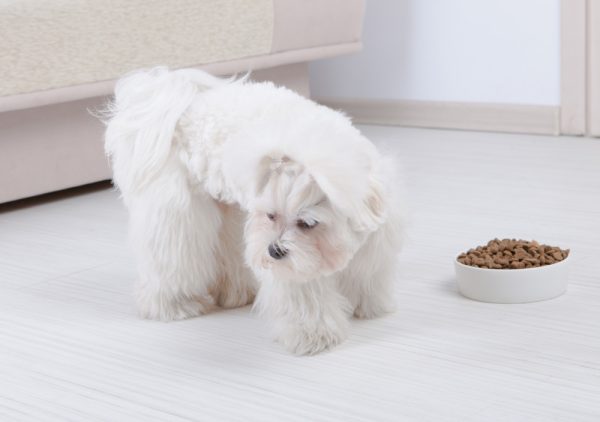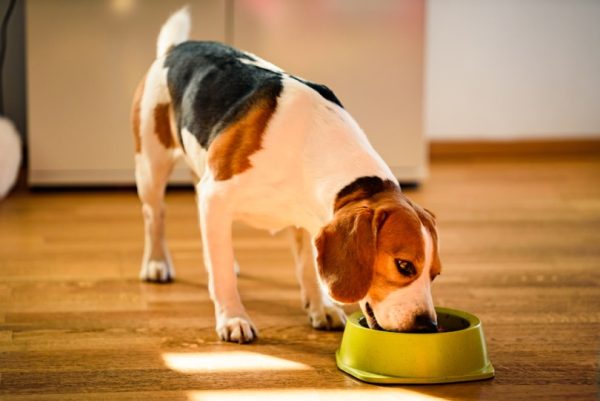In this article
If you’re one of the millions of dog owners who let their pets sleep with them, you probably love the comfort of cuddling with your Pitbull. What you may be less excited about, however, is all the noise they make when they’re sleeping! Like humans, Pitbulls can snore when air passes through their nose and throat vibrates.
Sometimes snoring is normal, but it may also indicate a health problem. Here are eight common reasons why your Pitbull is snoring.

10 Vet-Approved Reasons Why Pitbulls May Snore
1. Sleep Position
| Is it serious: | Not usually |
| Is veterinary care required: | Not usually |
Any condition that blocks or changes the shape of your dog’s nose, mouth, or throat may cause them to snore. Sometimes, that’s as simple as your Pitbull’s sleeping position. For example, if your dog loves to snooze on their back, they may snore because their tongue partly blocks the airway and windpipe in that position.
Try shifting your dog’s position as they sleep to see if that solves their snoring problem. If not, consider speaking to a vet and check out the other possible reasons on our list.
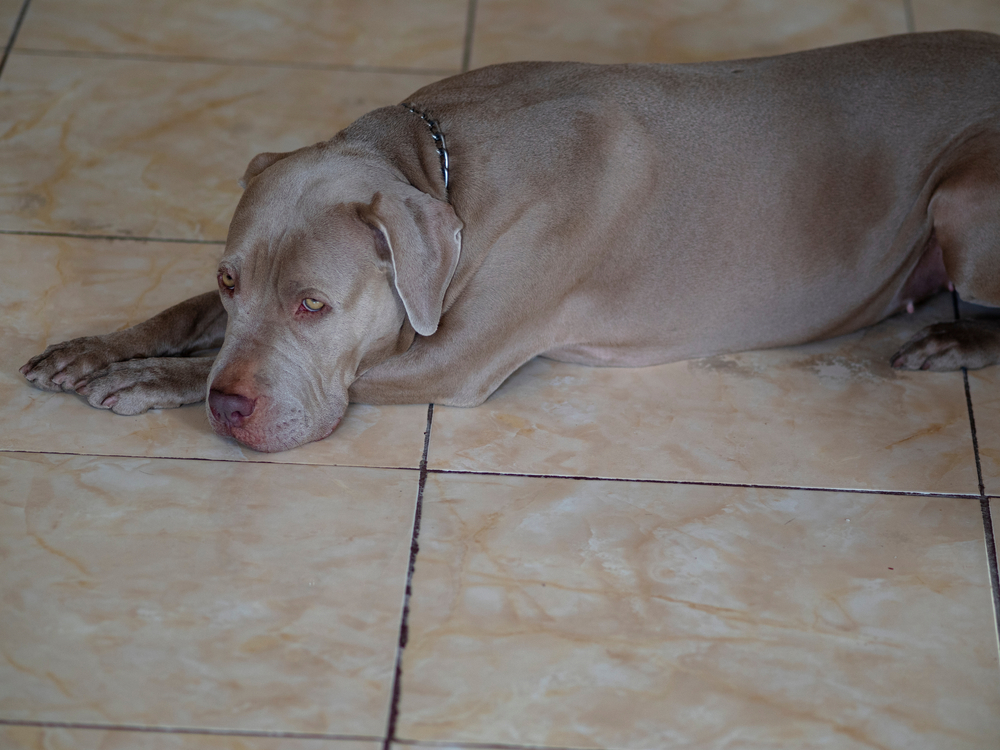
2. Nose Shape
| Is it serious: | Sometimes |
| Is veterinary care required: | Sometimes |
Dogs with abnormally flat noses and faces typically snore more than others. These breeds, such as Bulldogs and Pugs, often have trouble moving air in and out even when they’re awake. Some Pitbulls also have short noses, although usually not to the same extent as true brachycephalic breeds.
If your Pitbull’s nose is short or their nostrils are narrow, it could be the reason they’re snoring. Some dogs require a surgical procedure to improve their breathing, while others can function normally.
3. Allergies
| Is it serious: | Sometimes |
| Is veterinary care required: | Yes |
If your Pitbull suffers from allergies, the condition could also be responsible for their nightly snoring, but this is uncommon. Unlike humans, dogs with environmental allergies are more likely to display skin issues as the allergen enters the body through the defective skin barrier rather than being inhaled. However, digestive issues and upper respiratory signs are also possible.
Allergic response and inflammation of the nose (rhinitis) can occur seasonally in association with pollen production, or throughout the whole year due to house dust mites and molds. Inhalation of smoke or irritant gasses can also cause signs of rhinitis.
This irritation and swelling could impact how air moves through the inflamed nasal passages, restricting airflow and leading to snoring. Depending on what your Pitbull is allergic to, you may need to treat them with medication or take other steps to improve the air quality in your house.
Consult your vet if you believe an allergy is a possible cause for your dog snoring or if your dog is showing other signs of rhinitis, such as discharge, sneezing, and/or labored breathing.
Did you know you can speak to a veterinarian without having to travel? Just head over to PangoVet. It's our online service where you can talk to a vet online and get the advice you need for your pet — all at an affordable price!

4. Upper Respiratory Infection
| Is it serious: | Sometimes |
| Is veterinary care required: | Yes |
Just like you tend to snore when you have a cold, your Pitbull may do the same if they suffer from an upper respiratory infection. Dogs may experience sneezing, coughing, and nasal discharge. Common conditions include kennel cough (often caused by a complex mix of viruses and bacteria), fungal disease, or nasal mites. The swelling, congestion, presence of discharge or mucus, and irritation in their nose and throat could cause snoring.
You’ll need to see your vet if you suspect your Pitbull has an upper respiratory infection. Some dangerous infectious diseases, like canine distemper, can also cause similar signs as a simple infection, so getting your dog diagnosed correctly is essential.
5. Infected Tooth
| Is it serious: | Yes |
| Is veterinary care required: | Yes |
If one of your Pitbull’s upper teeth becomes infected, the resulting abscess may spread into your dog’s sinus cavity and nose, causing inflammation and swelling. This might impact the normal airflow, potentially causing your dog to snore, although this is rare and occurs only later in the disease process.
Signs you are likely to notice first are reduced appetite, bad breath, trouble eating and chewing on toys, pain, sore gums, drooling, discharge, and swelling on the face. Tooth root abscesses can be painful and may also spread the infection to other body parts through the bloodstream. This condition needs urgent veterinary care. Treatment generally involves removing the tooth, along with medications.
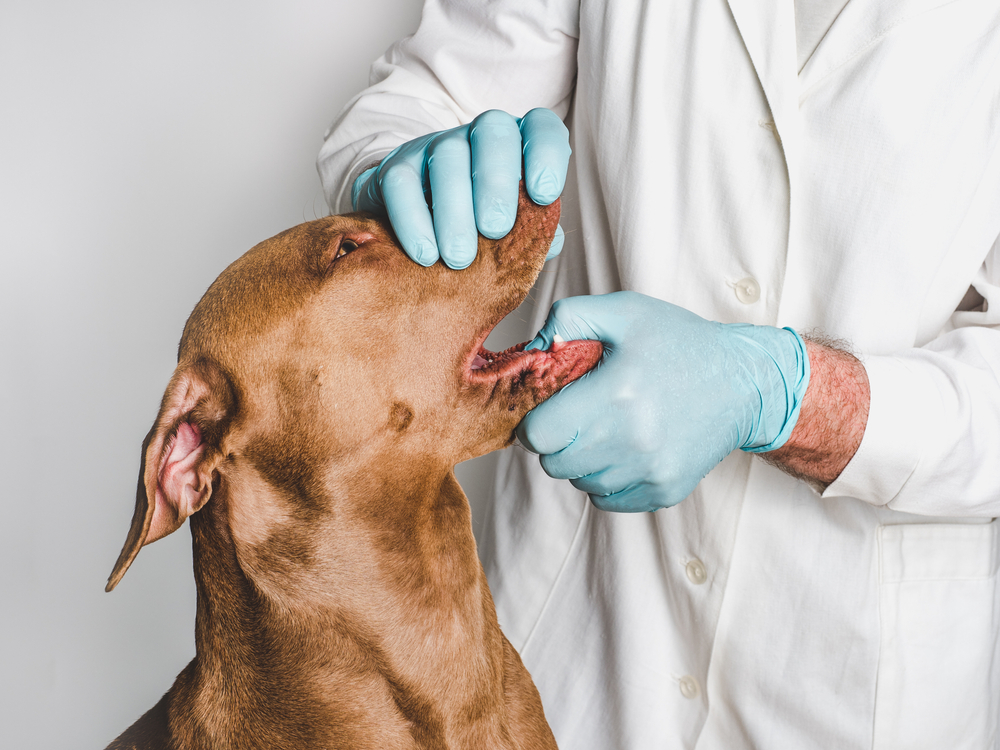
6. Foreign Object in the Nose
| Is it serious: | Yes |
| Is veterinary care required: | Yes |
Because dogs use their noses to investigate everything, they sometimes snort up something that doesn’t belong. Any foreign object, such as a blade of grass, piece of food, dirt, or bug that gets stuck in your Pitbull’s nose, could cause them to snore.
Besides snoring, you may notice your dog frequently sneezing, pawing at their nose, or having a discharge, often bloody. A trip to the vet is required to find out what’s going on.
7. Obesity
| Is it serious: | Yes |
| Is veterinary care required: | Sometimes |
Many Pitbulls love to eat and are excellent beggars, too. If your dog has conned one too many snacks out of you, they may have also gained too much weight. Obesity is a common cause of snoring in dogs. Overweight dogs often pack on excess fat in the neck and throat area, which can restrict normal airflow, resulting in snoring.
Snoring may be annoying, but obesity can cause other, more serious health issues for your Pitbull. You may need your vet’s help to calculate how many calories your dog should eat daily. They can also suggest an exercise routine to help your pup shed a few pounds.

8. Laryngeal Paralysis
| Is it serious: | Yes |
| Is veterinary care required: | Yes |
Several conditions can lead to a weakness in the nerves controlling the windpipe (larynx), which in turn can lead to laryngeal paralysis, the failure of the windpipe to open correctly while breathing in. Signs of this include noisy breathing during the day, coughing, reduced exercise tolerance, panting, and change in the bark.
Noisy breathing due to laryngeal paralysis can also be noticed while the dog is sleeping and this could sound similar to snoring. If you notice noisy breathing in your Pitbull, which may sound similar to snoring, especially during the day, or if you suspect they may have laryngeal paralysis, contact your vet as this condition will warrant a prompt veterinary check.
Any tumor or swelling in the neck and throat area can also lead to laryngeal paralysis. The condition often occurs in older dogs due to progressive muscle and nerve weakness. Another disorder often associated with laryngeal paralysis is hypothyroidism, a medical condition where the dog’s body doesn’t produce enough of a hormone that regulates their metabolism.
Hypothyroidism then leads to windpipe nerve weakness and muscle wasting (atrophy). Some of the other more common signs include weight gain, lethargy, frequent skin and ear infections, and excessive hair loss.
9. Tumors and Polyps
| Is it serious: | Yes |
| Is veterinary care required: | Yes |
Tumors in the nose, sinuses, and windpipe in dogs are more often malignant than not and will require veterinary attention. Chronic discharge from the nose is the most common sign, often bloody or thick, but sneezing, nose bleeds, and noisy breathing may occur. Polyps are benign growths and a biopsy is required to differentiate them from tumors.
Noisy breathing in case of polyps and tumors happens due to them blocking parts of the airways, causing a change in airflow and subsequent noise. This can be noticed and described as snoring during sleeping.
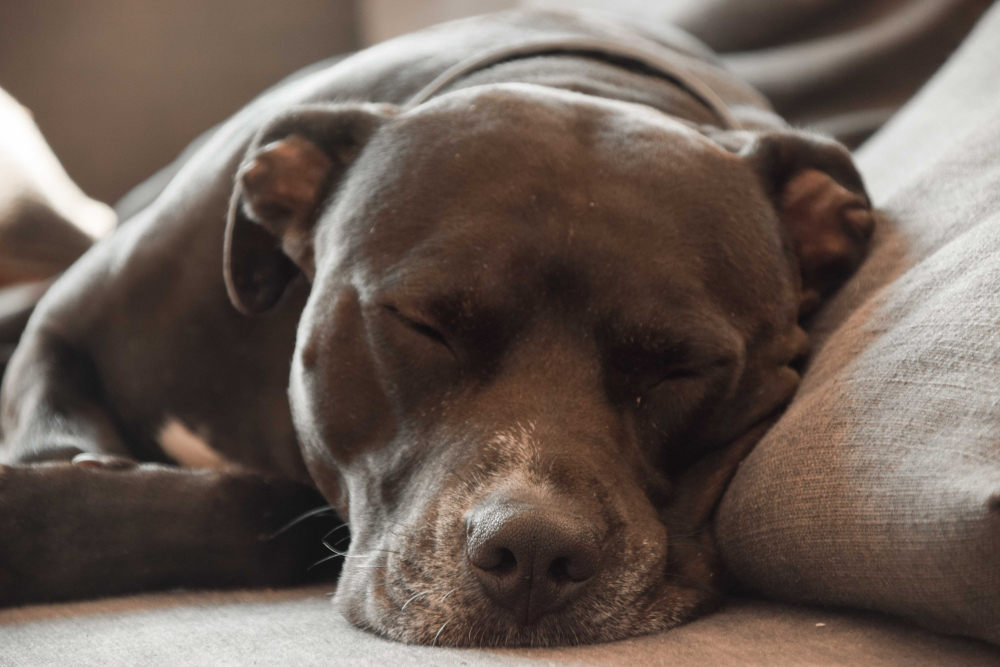
10. Sleep Apnea
| Is it serious: | Yes |
| Is veterinary care required: | Yes |
You have probably often heard of sleeping disorders in people, one of which is sleep apnea, causing the person to stop breathing for a short period during their sleep, before then continuing to breathe normally. During this transition, a loud gasp can be let out that sounds like snorting or snoring.
Obstructive sleep apnea is uncommon, and poorly described in dogs, and is often associated with brachycephalic obstructive airway syndrome (BOAS), in “flat face” dog breeds. Sleep apnea has been reported in the English bulldog. The majority of Pitbull breeds have intermediate skull and nose length, in comparison to the brachycephalic breeds that have shortened muzzles.
In cases of extreme breeding, depending on the skull and nose length, some individual Pitbulls could have a higher risk of BOAS syndrome and a predisposition for sleep apnea that causes noisy breathing and snoring-like sounds, although this seems rare.

Should You Be Concerned About Your Pitbull’s Snoring?
As we’ve learned, there could be several reasons why your Pitbull is snoring, but not all of them are a cause for immediate concern. If your dog has always snored or only snored in certain sleeping positions, it’s likely normal for them.
However, if snoring is a new habit or if you notice any other signs of illness, it’s a good idea to have your dog checked by a veterinarian. If your dog displays noisy breathing when awake, take it to the vet immediately, especially if you notice wheezing or your dog seems to be struggling to breathe.
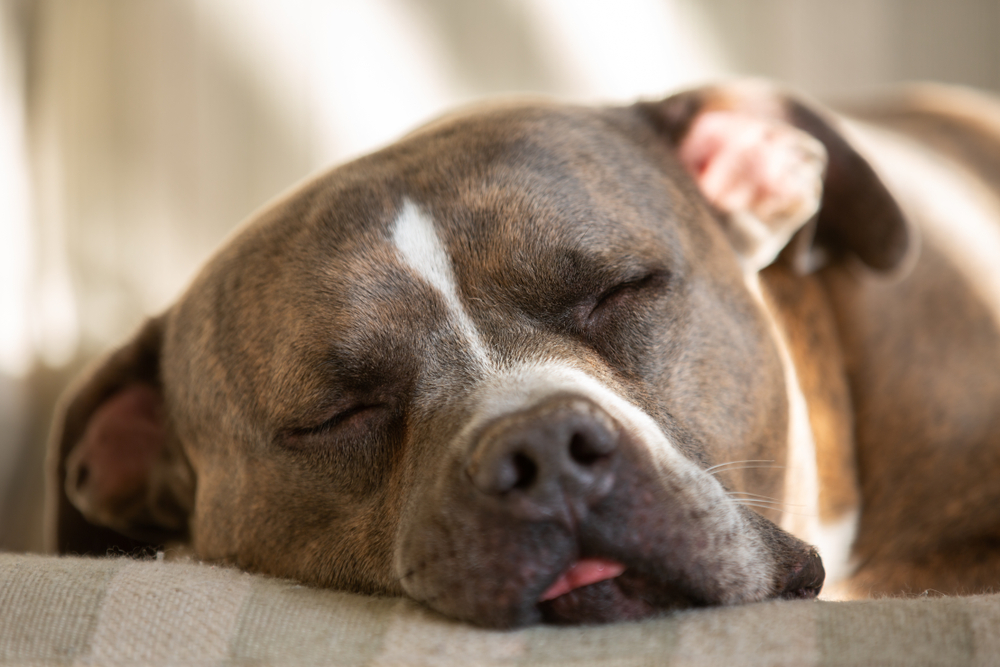

Conclusion
You may worry about your Pitbull’s snoring because humans can suffer from dangerous conditions like sleep apnea. Thankfully, this condition rarely affects dogs, so your Pitbull’s snoring is most likely the result of one of the other nine reasons we discussed in the article.
While you may be able to treat some of the causes of snoring, it’s also possible that your Pitbull is just a naturally noisy sleeper. If you don’t want to banish your pup from the bedroom, it might be time to invest in earplugs!
Featured Image Credit: dogboxstudio, Shutterstock
